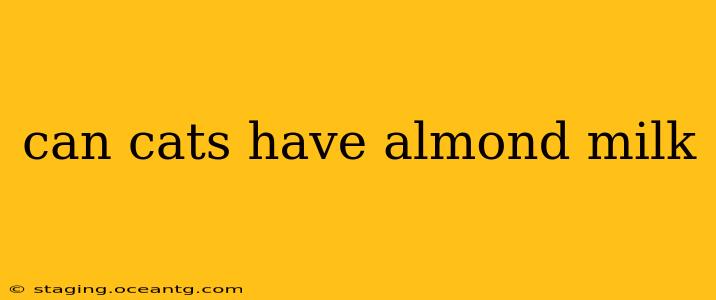Can Cats Have Almond Milk? A Comprehensive Guide for Concerned Cat Owners
The question of whether cats can safely consume almond milk is a common one among cat owners. While seemingly harmless, the answer isn't a simple yes or no. Let's delve into the details to understand the potential benefits, risks, and alternatives.
Understanding Cat Dietary Needs:
Cats are obligate carnivores, meaning their bodies are designed to thrive on a diet primarily consisting of meat. Their nutritional requirements differ significantly from humans, and substituting their natural food sources with alternatives like plant-based milk can lead to health issues.
Why Almond Milk Isn't Ideal for Cats:
- Lactose-Free, But Not Cat-Friendly: While almond milk is lactose-free, making it suitable for humans with lactose intolerance, it lacks the essential nutrients cats need. It's low in protein and taurine, crucial amino acids for feline health. Taurine deficiency can lead to serious heart problems and blindness in cats.
- Nutritional Imbalance: Almond milk contains primarily carbohydrates and fats derived from plants. Cats require a diet rich in animal protein for optimal health. Replacing meat-based protein with almond milk can result in malnutrition.
- Potential for Digestive Upset: Some cats might experience digestive discomfort, including diarrhea and vomiting, after consuming almond milk due to its high sugar content and inability to digest certain plant-based components effectively. The addition of artificial sweeteners or thickeners can further exacerbate these issues.
- Hidden Additives: Commercial almond milk often contains added sugars, stabilizers, and flavorings. These additives are unnecessary and potentially harmful for cats. Even unsweetened varieties might contain ingredients that are difficult for feline digestive systems to process.
Can Cats Drink Almond Milk Occasionally?
While a tiny lick or two of plain, unsweetened almond milk is unlikely to cause severe harm, it's not recommended to make it a regular part of your cat's diet. The potential risks far outweigh any minimal benefits.
What Happens if My Cat Drinks Almond Milk?
If your cat drinks a small amount of almond milk, closely monitor them for any signs of digestive upset such as vomiting, diarrhea, or changes in appetite. If you notice any concerning symptoms, contact your veterinarian immediately.
What are Better Alternatives to Almond Milk for Cats?
Instead of offering almond milk or other plant-based milk alternatives, focus on providing your cat with a nutritionally complete and balanced diet formulated specifically for felines. This typically means high-quality commercial cat food or a carefully planned homemade diet under veterinary guidance. If your cat needs hydration, plain water is always the best choice.
My Cat Likes Almond Milk - How Can I Stop Them?
Cats can be quite persistent when it comes to food they enjoy, even if it’s not good for them. The key is to make their regular food more appealing. Try offering different flavors, textures, or serving temperatures. You might also want to consult your veterinarian or a certified feline nutritionist for advice on how to manage your cat's food preferences and ensure they're getting the proper nutrition.
Conclusion:
In summary, almond milk is not a suitable substitute for water or a balanced feline diet. While small amounts might not cause immediate harm, regular consumption can lead to nutritional deficiencies and health problems. Always prioritize your cat's health by providing them with a diet tailored to their specific needs. If you have any concerns about your cat's diet, consult a veterinarian for personalized advice.
